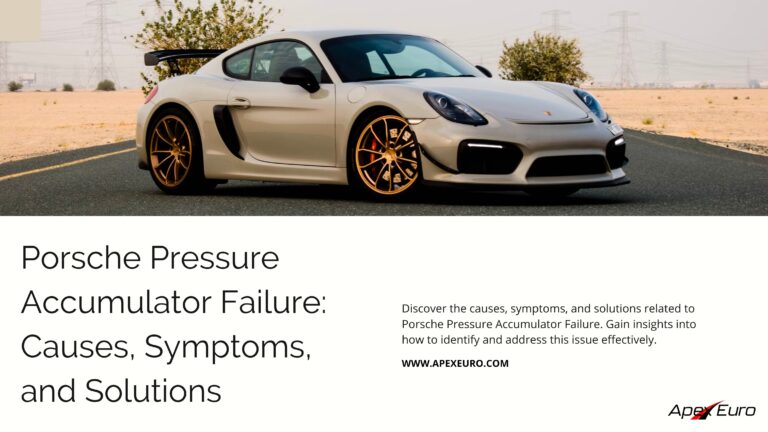When it comes to the performance and reliability of your Porsche vehicle, understanding potential issues like pressure accumulator failure is crucial. The Porsche Pressure Accumulator Failure is a concerning problem that can impact the performance and safety of your car. In this article, we will delve into the causes, symptoms, and solutions related to this issue, providing you with valuable insights to maintain and optimize your Porsche’s performance.

The Porsche Pressure Accumulator Failure occurs when the pressure accumulator, a vital component of the vehicle’s hydraulic system, malfunctions. This component is responsible for regulating hydraulic pressure and ensuring smooth functioning of various systems in your Porsche, such as the suspension and brake systems. When the pressure accumulator fails, it can lead to a range of issues that affect the overall driving experience.
Several factors can contribute to the failure of the pressure accumulator in your Porsche. It’s important to be aware of these causes to take preventive measures and ensure the longevity of your vehicle. Some common causes include:
Detecting the early signs of pressure accumulator failure can save you from major troubles down the road. Here are some common symptoms to look out for:
When you encounter symptoms of pressure accumulator failure, it’s crucial to take immediate action to prevent further damage and ensure your safety on the road. Here’s what you can do:
Q: Can I continue driving my Porsche if I suspect pressure accumulator failure?
A: It’s advisable to avoid driving your Porsche if you suspect pressure accumulator failure, as it can compromise safety and lead to further damage. Get the issue diagnosed and addressed promptly.
Q: How often should I have my Porsche’s hydraulic system checked?
A: It’s recommended to have your Porsche’s hydraulic system checked during routine maintenance appointments, typically every 12,000 to 15,000 miles.
Q: Can pressure accumulator failure impact other vehicle systems?
A: Yes, pressure accumulator failure can affect multiple systems, including the suspension and brake systems, leading to a compromised driving experience.
Q: Is pressure accumulator replacement expensive?
A: The cost of pressure accumulator replacement can vary based on factors such as the model of your Porsche and labor costs. However, investing in timely replacement can prevent more extensive and costly damage.
Q: How can I maintain my Porsche’s hydraulic system?
A: Regularly check the hydraulic fluid levels and adhere to the manufacturer’s recommended maintenance schedule for hydraulic system servicing.
Q: Are there any DIY solutions for pressure accumulator failure?
A: It’s not advisable to attempt DIY solutions for pressure accumulator failure, as it requires specialized knowledge and equipment. Seek professional assistance for accurate diagnosis and repair.
Understanding the nuances of Porsche Pressure Accumulator Failure is essential for maintaining your vehicle’s performance and safety. By recognizing the causes, symptoms, and solutions related to this issue, you can take proactive measures to ensure your Porsche continues to deliver an optimal driving experience. Remember to prioritize regular maintenance and seek professional assistance when needed to keep your Porsche running smoothly on the road.